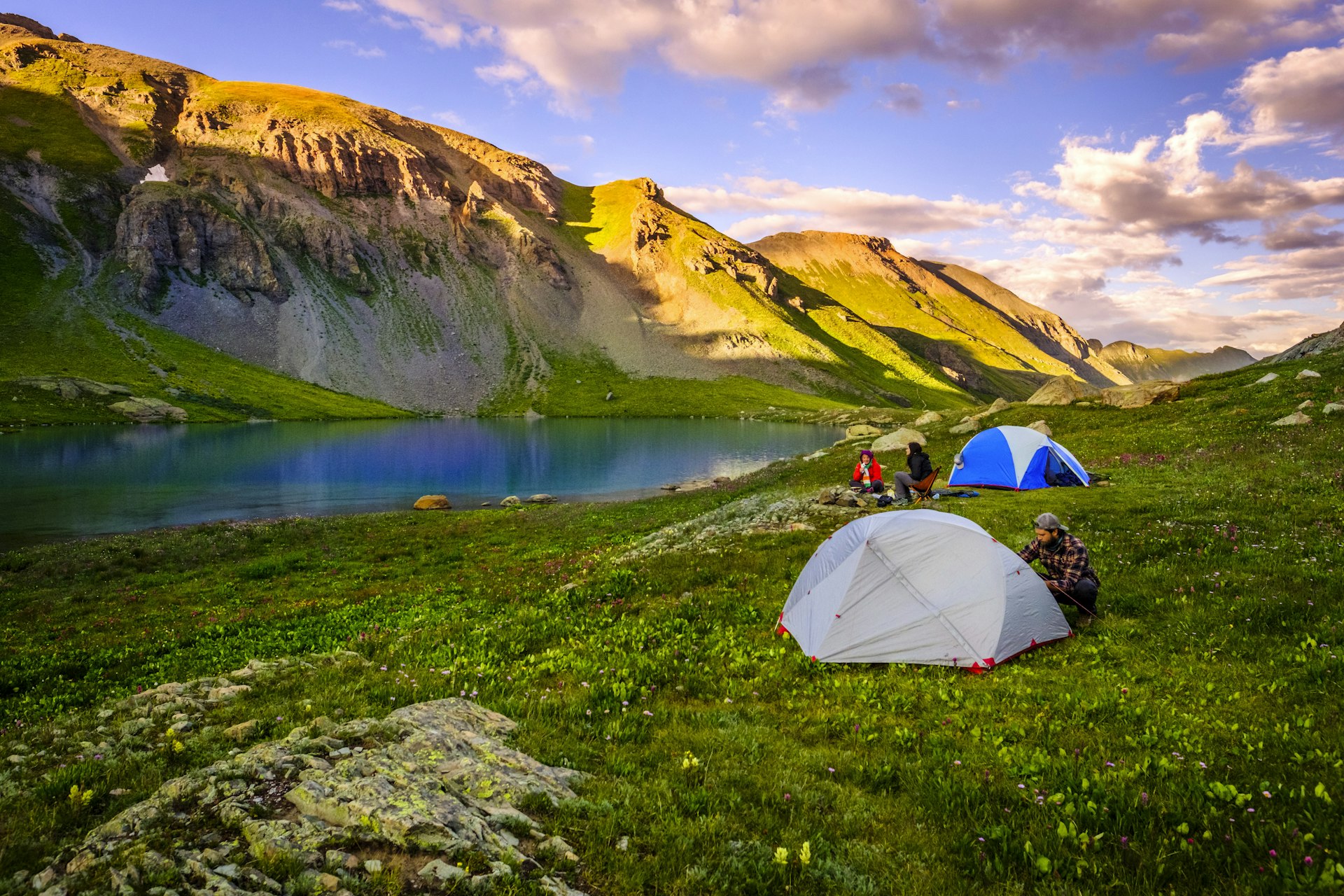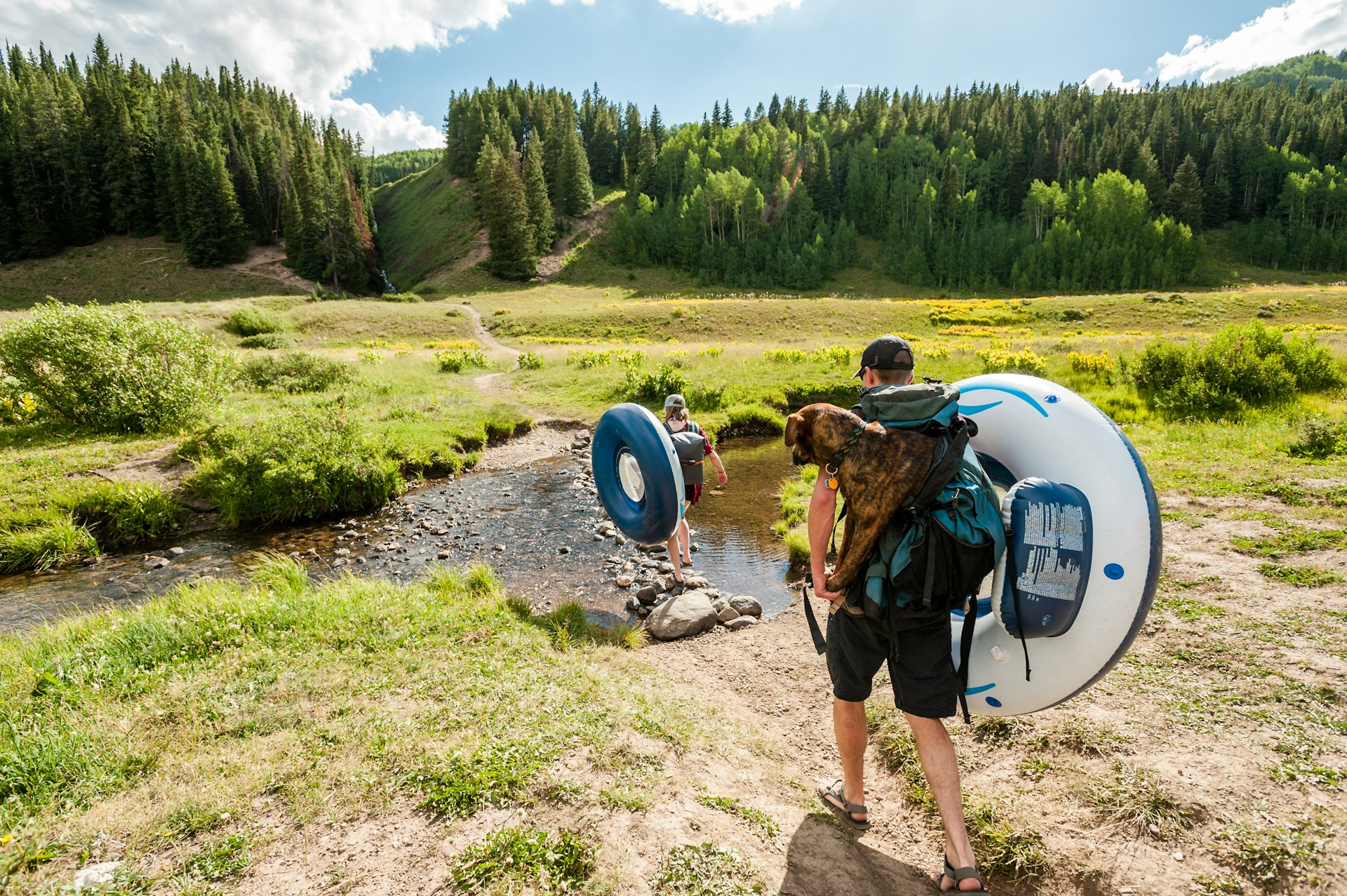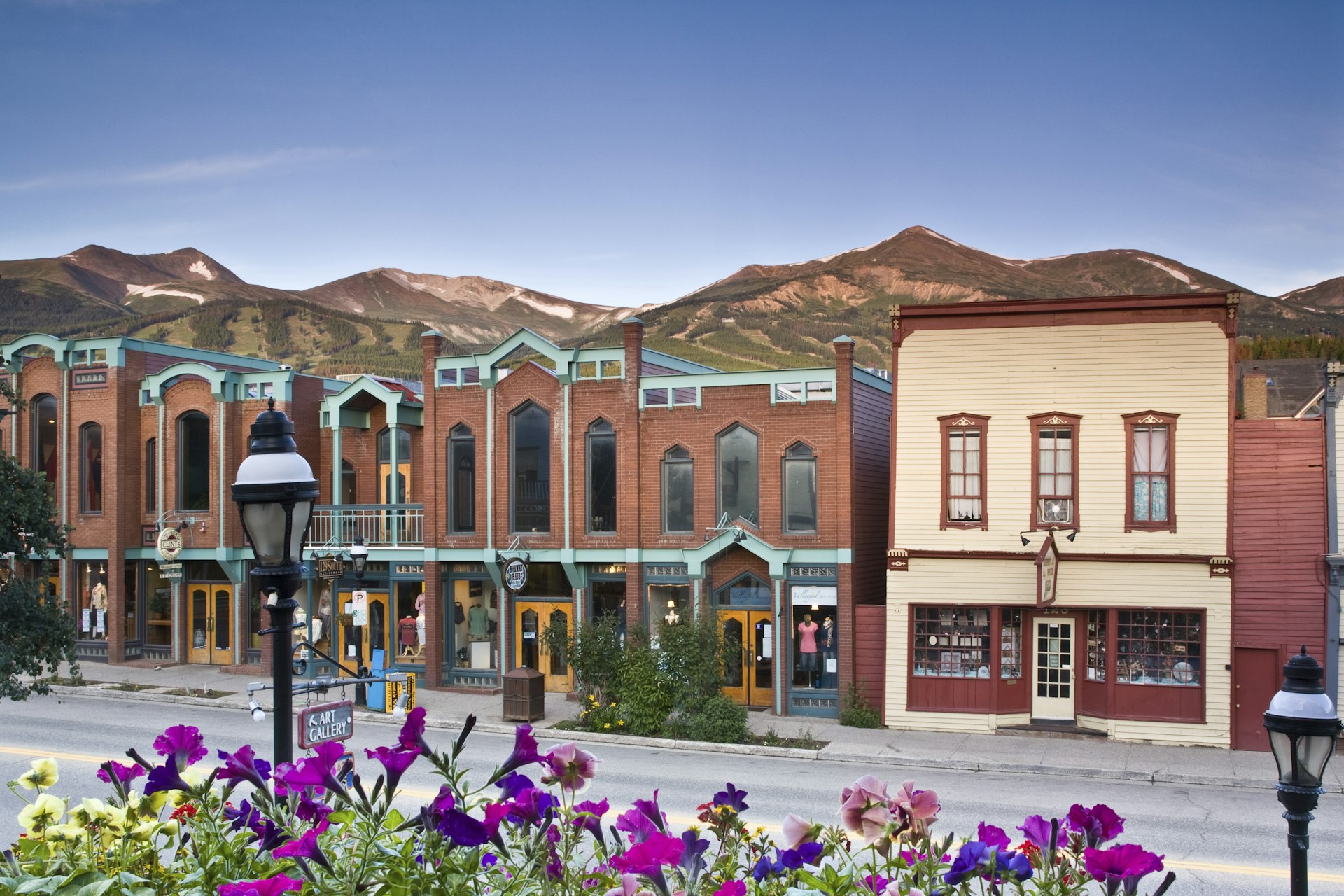Don’t tell winter, but summer is my favorite season in Colorado.
Sure, skiing is great and I love venturing up to the mountains for exhilarating powder days and cozy evenings with hot chocolate in front of a roaring fireplace. But ever since moving to Colorado more than a decade ago, I’ve eagerly awaited the day when the snow begins to melt, the ground begins to thaw and pale purple pasque flowers start to emerge – sure signs of spring, followed quickly by glorious summer.
Every year, I always plan at least a handful of long weekends in Colorado’s Rocky Mountains between May and September. I fill my days with al fresco dining, hiking and mountain biking, street fairs and festivals, birdwatching, art exhibits, brewery visits, farmers market strolls and more. Here are my top tips for planning the ultimate summer vacation in the Colorado mountains.
Step 1: Choose where to base yourself
On a map, Colorado’s mountainous region may look small and manageable. But, in reality, many of the state’s high-elevation destinations are spread out and separated by impassable terrain—you may end up needing to drive a few hours to reach a mountain town that looks super close on paper. (Case in point: Aspen and Crested Butte are only 11 miles apart as the crow flies – and people often hike between the two – but they are more than 3 hours apart by car.)
As such, it’s best to hone in on one specific region and base yourself there. When you stay in one of the following mountain towns, you’ll have easy access to outdoor adventures, as well as restaurants and bars, boutiques, arts venues and a variety of lodging options. From each one, you can easily explore neighboring towns without spending tons of time in transit.
First time visiting Colorado? Here are 16 of the best things to do throughout the state
Aspen
Vibes: High-end shops, galleries, historic Victorian homes and mega-mansions, all surrounded by lush green wilderness. Outdoor activities are a major focus in the summer, but Aspen also has a thriving arts and culture scene, with lots of museums, performing arts venues, concert series, historic sites and cultural events.
Do: Spend a quiet afternoon among the flowers and hummingbirds at the John Denver Sanctuary. This serene park, located on the banks of the Roaring Fork River, features massive boulders etched with song lyrics and quotes. Turn it into a picnic by grabbing snacks and charcuterie fixings from Meat & Cheese, a beloved downtown restaurant and farm shop.
Eat: Make a reservation to dine at Bosq, which became the first and only Aspen restaurant to win a coveted Michelin star when the guide came to Colorado last year. Here, chef-owner Barclay Dodge plates up wild foods his team forages from the mountains. It’s pricey, but absolutely worth it.
Stay: Spend the night inside an Aspen icon by booking a room at the Hotel Jerome, which has stood at the corner of Main and Mill streets downtown for 135 years. Built in 1889, this stately property has seen it all, and you can learn about the hotel’s long history when you take a one-hour tour with the Aspen Historical Society.
Breckenridge
Vibes: A lively, walkable Main Street with souvenir shops and outdoor apparel stores, with rugged peaks in the background. Breck is a favorite spot for both young families and bachelorette parties, so there’s quite the diverse mix of activities (and great people-watching).
Do: Book a workshop at Breck Create, a nonprofit arts organization. You can learn printmaking, glassblowing, screen printing, oil painting, metal smithing and a slew of other artistic skills. If you don’t want to get your hands dirty, spend an afternoon wandering around the downtown campus – dubbed the Breckenridge Arts District – where historic buildings have been repurposed as art studios, galleries and performance spaces.
Eat: Treat yourself to dinner at either Radicato or Rootstalk, which are both helmed by chef-owner Matt Vawter, who’s currently in the running for a James Beard Award. Radicato serves up house-made pastas and other Italian fare, while Rootstalk specializes in contemporary American cuisine. If you’re celebrating a special occasion or just want to indulge while on vacation, do the seven-course seasonal chef’s tasting menu with wine pairings at Rootstalk.
Stay: Check into The Carlin, a new downtown property inspired by the charming inns found in small European towns. It’s been described as a “restaurant with rooms.” The main draw is the ground-floor restaurant that specializes in seafood and light, coastal cuisine. But after dinner, you’ll be able to wander upstairs and simply fall into bed. (There’s also a subterranean tavern if you’re still feeling thirsty.)
Crested Butte
Vibes: Small town with a funky, independent streak and prime wildflower viewing. Crested Butte is remote and requires some extra effort to reach (compared to the Colorado mountain towns along I-70), so the people who end up here really want to be here.
Do: Take the chairlift up, then ride a mountain bike down at Crested Butte Mountain Resort, which has more than 30 miles of singletrack. If you visit during July or early August, you’ll be pedaling through fields of wildflowers.
Eat: For your morning fix or a mid-afternoon pick-me-up, drive up to Coffee Lab in the ghost town of Gothic. It’s an adorable little stop in the historic town hall building, and all proceeds go to the Rocky Mountain Biological Laboratory, a nonprofit field station that facilitates high-elevation scientific research.
Stay: If you’re traveling with a group, consider booking out Scarp Ridge Lodge. This unique property located inside an old saloon right downtown is like a vacation rental on steroids, with cruiser bikes, chef-prepared breakfasts and snacks, a rooftop hot tub and more.

Step 2: Book your accommodations
You’ll find a wide array of different lodging options in Colorado mountain towns—from large homes on Airbnb and Vrbo that can accommodate a big crowd to rustic cabins to upscale hotels to budget-friendly motels. The vast majority of accommodations are located right in town, which makes it easy to get around. If you’re looking for a truly woodsy, rugged experience, you will find a smattering of rural vacation rentals without any neighbors (but not very many).
Summer tends to be less busy than winter in most Colorado mountain towns (especially those with ski resorts), so you should have no trouble booking accommodations, even if you’re planning a last-minute trip.
There are a few exceptions to this rule, however. Hotels and vacation rentals tend to book up several months in advance for holidays, like Memorial Day, the Fourth of July and Labor Day, so you may find slimmer pickings for those dates.
For the entire summer, campsites also tend to book up as soon as reservations open, which is usually six months in advance. But many campgrounds also have a handful of first-come, first-served sites, so if you’re willing to take a chance, you may still be able to go camping (though it’s a good idea to have a back-up plan in case all the spots are full). If you don’t mind really roughing it, you can also use apps like iOverlander to find free, dispersed campsites on public land – just be aware that these spots don’t have services or amenities (read: no bathrooms).
Step 3: Plan the best things to do in the Colorado mountains
Take a day trip
From Aspen: Head to Glenwood Springs and spend an afternoon soaking at either Iron Mountain Hot Springs or Glenwood Hot Springs Pool.
From Breckenridge: Cool off with a trip to Dillon Reservoir, where you can learn to sail, rent kayaks and paddleboards, or build sandcastles along the shoreline.
From Crested Butte: Plan an outing to Black Canyon of the Gunnison National Park, an uncrowded and geologically stunning area featuring a deep gorge carved by the Gunnison River.
Get outside
No surprise here: outdoor adventures reign supreme in the Colorado mountains. But you can tailor your experience depending on your comfort and skill level. Want a mellow outing that lets you commune with nature? Book a guided fly-fishing session. Want to get your heart racing? Rent a mountain bike or go whitewater rafting. Want to take in some panoramic views? Hike to the top of a peak with your camera. You can go it alone but, if you’d feel more comfortable with a guide, there are lots of outfitters who’d be happy to show you around.
Learn about mining history
Many Colorado mountain destinations are former mining towns, where fortune-seekers toiled to unearth gold, silver, lead, zinc, coal and other valuable materials buried deep underground. Whether you consider yourself a history buff or not, it’s fun to step back in time and learn more about how these communities got their start. You can book guided tours, visit historic mining sites and even see old mining equipment and ruins on some hiking trails.
Wondering how to do Aspen on a budget? These experiences don’t cost a penny
See a show under the stars
Aside from a brief afternoon thunderstorm or two, the weather is basically perfect in the mountains in the summer. Many Colorado mountain towns have outdoor concert series or performing arts venues, where you can catch a show and stargaze at the same time. With clear skies and very little light pollution, this is an ideal pairing.
In Aspen, check out the Aspen Music Festival, which is celebrating its 75th anniversary this year. In Breck, enjoy neighborhood pop-up shows from the Breck Music AirStage, a repurposed 1975 Airstream trailer that transforms into a stage. And sway to free live music at Crested Butte Town Park during the weekly Alpenglow concert series.
Live it up at summer festivals
There’s a festival on the calendar nearly every weekend in the Colorado mountains—and they’re tons of fun. Research the dates of your trip to see which annual events overlap with your visit, then make plans to attend. A few of my favorites include the Breckenridge Wine Classic, the Crested Butte Wildflower Festival, and the Jazz Aspen Snowmass June Experience or Labor Day Experience.

Step 4: Plan your menu and choose the best places to eat in the Colorado mountains
Shop the farmers market
You’ll find local fruits and veggies, artisanal products, homemade treats, wine and other goodies at weekly farmers markets in Aspen (Saturdays), Breckenridge (Sundays) and Crested Butte (Sundays). Stock up for snacking or nights when you don’t feel like going out to eat.
Visit craft breweries
Whenever I road trip to the mountains, one of my first stops is usually the local craft brewery. At these casual spots, you can order a taster flight to find your favorite style, play lawn games, order from food trucks and chat with residents. I love any and all Colorado craft breweries, but I’d recommend The Eldo Brewery in Crested Butte, Aspen Brewing Company and Broken Compass Brewery in Breckenridge. If beer isn’t your thing, head to Carboy Winery in Breckenridge to sample Colorado wines or Montanya Distillers in Crested Butte to try Colorado rum instead.
Sample Colorado-inspired cuisine
Colorado’s rugged landscape has inspired lots of restaurant menus, which often feature mountain-inspired fare like elk tenderloin, rainbow trout, buffalo and wild game sausage. Dig in at spots like Pine Creek Cookhouse in Aspen, Briar Rose Chophouse and Saloon in Breckenridge and Elk Ave Prime in Crested Butte.
Step 5: Decide how will you get there
You can easily road trip to Colorado’s mountain towns from wherever you live—though once you arrive, you probably won’t use your car that much. Traffic and parking can be nightmarish in Colorado’s mountain towns, which are limited on space, so more than likely you’ll park your vehicle at your hotel or vacation rental, then walk, bike or take public transit everywhere else.
Another option is to fly into Denver International Airport, then rent a car or reserve a shuttle to get you the rest of the way. Some Colorado mountain towns have regional airports, but they’re small and usually have limited flight schedules; you’ll likely end up connecting through Denver.
Step 6: Pack your bags
Colorado’s mountain towns are between 8,000 and 10,000 feet above sea level. This means warm, sunny days with temperatures into the 60s and 70s and very little humidity. But, at night, temps plummet to the 40s and 50s. Pack comfy active wear for daytime activities, but be sure to bring at least one pair of long pants and a thick sweatshirt or jacket if you plan on spending time outside in the evenings. You can get away with sandals for leisurely downtown strolls, but sturdy walking or hiking shoes are a must for anything else.
If you remember to pack nothing else, make it sunscreen and a reusable water bottle. At such high elevations, you’ll get sunburned and dehydrated much more quickly than you’re used to back home. (And if you do end up forgetting these things, you’ll still be able to buy them when you arrive – but be prepared for a little sticker shock, as mountain town prices are steep.)
Colorado’s mountain towns are extremely casual – most places you’ll see folks wearing jeans, shorts and t-shirts, even at dinner. That said, if you are planning to treat yourself to a meal at an upscale restaurant, consider tossing a slightly nicer outfit into your bag: a breezy sundress with sandals and a jean jacket, or slacks or nicer jeans with a polo or a collared button-down shirt. (In Aspen, people dress to the nines, so pack your designer clothes and handbags, if you’ve got ‘em.)
